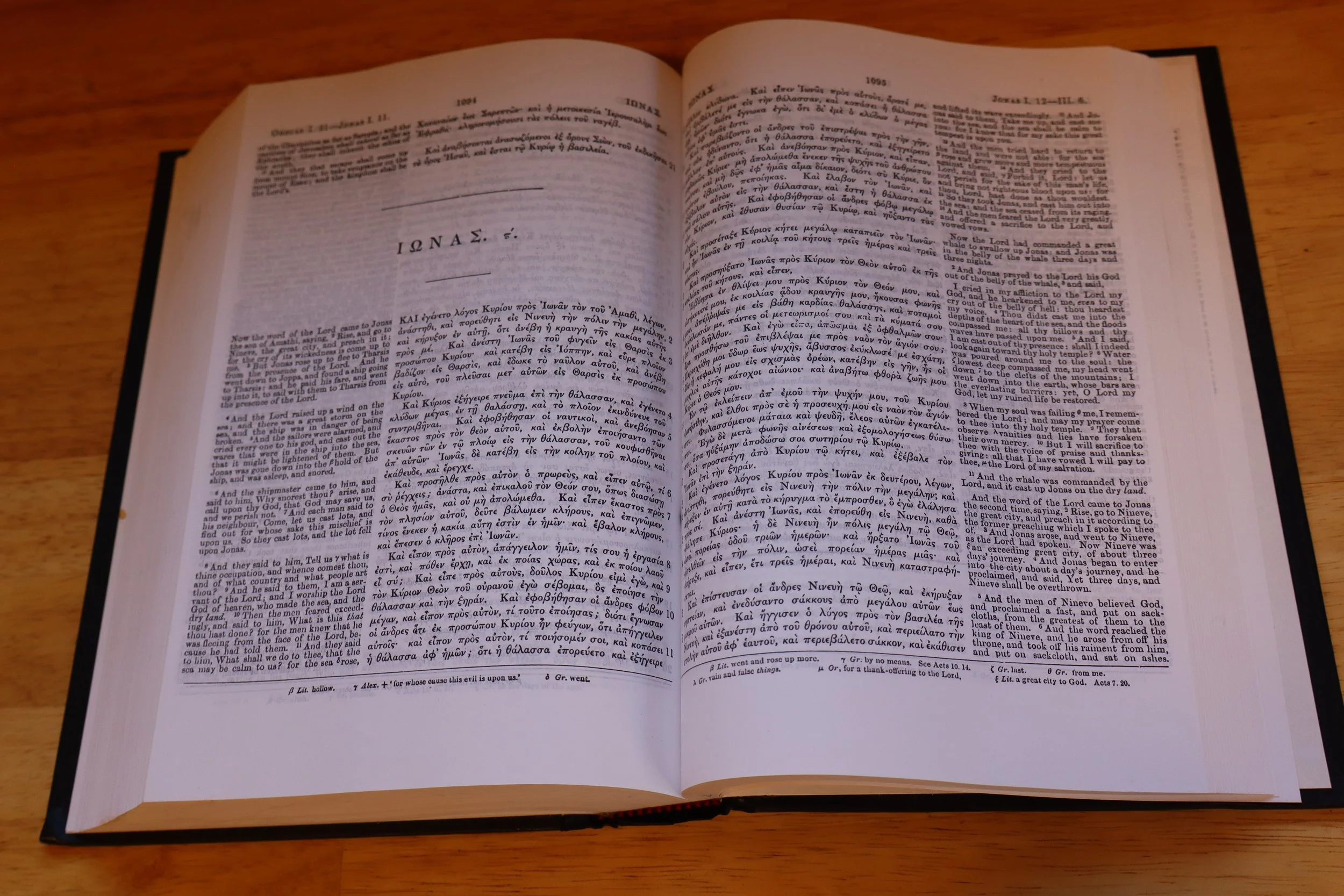Delving into Ancient GREEK BIBLICAL Texts: The Brenton Septuagint and Apocrypha
Sir Lancelot Charles Lee Brenton's "The Septuagint with Apocrypha: Greek and English" is a pivotal work in the study of biblical texts, providing an English translation of the Septuagint alongside the original Greek. This article explores the features, importance, and impact of Brenton's translation on biblical scholarship and religious practice.
The Brenton Septuagint and Apocrypha, translated by Sir Lancelot C.L. Brenton in 1851, remains one of the most widely used and respected English translations of the Greek Old Testament. It provides a parallel Greek-English text, making it an essential resource for biblical scholars, students, and anyone interested in deepening their understanding of the Old Testament and its historical context.
Overview of the Work
Published in 1851, Brenton's translation has since become a standard reference for those studying the Septuagint, the Greek Old Testament, which predates the Masoretic Text of the Hebrew Bible. Here's what makes this edition significant:
Key Features:
Bilingual Presentation: Brenton's work is laid out in a parallel format, with the Greek text on one side and the English translation on the other. This side-by-side arrangement allows for easy comparison and study of the original Greek alongside its English rendering.
Comprehensive Coverage: The translation includes all books of the Septuagint, which encompasses not only the books found in the Hebrew Bible but also the Deuterocanonical or Apocryphal books, which are recognized by some Christian denominations but not by others, notably Protestantism.
Literal Translation: Brenton aimed for a faithful, literal translation from the Greek, which sometimes results in a less idiomatic English text, prioritizing accuracy over readability for scholarly purposes.
Textual Apparatus: While not as extensive as some modern critical editions, Brenton's work includes some notes on textual variants, providing a basic level of textual criticism for readers.
Significance in Biblical Studies:
Historical Importance: The Septuagint is crucial for understanding the textual history of the Bible, especially since it was the version most often quoted by the New Testament writers. Brenton's translation thus serves as a bridge to this ancient text, offering insights into how early Christians understood the Old Testament.
Theological Studies: For theologians, especially those from traditions that include the Apocrypha in their canon, Brenton's work is invaluable for doctrinal studies, liturgical use, or for exploring the theological implications of different textual traditions.
Linguistic and Translation Studies: Scholars studying the evolution of language or translation practices can use Brenton's work to compare the Greek with other translations, assessing how translators have interpreted and rendered ancient texts into modern languages.
User Experience and Impact:
Accessibility: Despite its age, the Brenton translation remains accessible, with numerous reprints and digital versions available. It's particularly useful for those who want to study the Septuagint but do not read Greek fluently.
Study Aid: For students, clergy, and laypeople interested in biblical studies, this edition is a crucial resource for personal study, sermon preparation, or academic research, providing direct access to the Septuagint's unique textual tradition.
Cultural and Religious Influence: Brenton's translation has influenced modern translations and scholarship, contributing to a broader understanding of biblical texts within English-speaking Christian communities.
Brenton's work remains an excellent resource for anyone exploring the Greek Old Testament, providing a rich resource for study, reflection, and theological inquiry.
Importance of the Septuagint
The Septuagint (LXX) is the earliest Greek translation of the Hebrew Scriptures.
The term "LXX" is derived from the Roman numeral for 70 (70 = LXX), and it refers to the Septuagint, the ancient Greek translation of the Hebrew Scriptures. The name "Septuagint" comes from the Latin word for seventy, indicating the traditionally held belief that 70 or 72 Jewish scholars were involved in the translation process. According to tradition, these scholars worked in Alexandria, Egypt, during the 3rd and 2nd centuries BCE, translating the Hebrew Bible into Greek to make it accessible to Jews in the Hellenistic world who no longer spoke Hebrew or Aramaic.
The LXX designation itself originated as shorthand for the translation's historical connection to these 70 (or 72) translators. This number, 70, was symbolic and often cited in ancient Jewish writings to represent the number of elders or scholars involved in significant religious endeavors. For example, the 70 elders mentioned in the Bible in Exodus 24:1, as well as the 70 nations in the table of nations in Genesis 10, were seen as symbols of completeness or universality, reflecting the broad and authoritative scope of the translation project, the LXX came to be used not only to refer to this translation of the Hebrew Scriptures but also as a significant textual tradition in its own right, especially in early Christian writings and in the Eastern Orthodox Church, where it remains the canonical Old Testament.
It was extensively used by early Christians and is frequently quoted in the New Testament. Studying the Septuagint allows scholars to:
Understand Early Jewish Thought: The translation reflects how Jewish scholars interpreted the Hebrew Bible in a Hellenistic context.
Explore New Testament References: Many New Testament authors quote directly from the Septuagint, making it crucial for exegesis and understanding biblical theology.
Access Textual Variations: The Septuagint often differs from the Masoretic Text, providing alternative readings that can illuminate textual variations in the Bible.
Features of Brenton's Edition
Parallel Greek and English Text: Brenton's edition provides the Greek text alongside a clear and accessible English translation, making it useful for both beginners and advanced readers.
Apocrypha Inclusion: This edition includes the Apocryphal books, which are vital for understanding the intertestamental period and the theological developments between the Old and New Testaments.
Critical Notes and Readings: Brenton's work includes various critical notes and alternative readings, offering a more comprehensive understanding of the text.
Why It’s a Valuable Resource
Accessibility: Unlike more modern editions that may focus on technical language, Brenton’s translation is straightforward, making it accessible to non-specialists.
Historical Significance: As one of the first complete English translations of the Septuagint, it remains a foundational text for those studying early biblical translations and their impact on Christian theology.
Widely Available: This edition, published by Hendrickson Publishers, is easily accessible in print and digital formats, making it a practical choice for personal study or academic use.
Contents:
Septuagint: This includes the translation of the Hebrew Bible (Old Testament) into Greek, which was historically significant as it was widely used by Hellenistic Jews and later by early Christians.
Apocrypha: Brenton's edition also includes the Apocryphal or Deuterocanonical books, which are Old Testament books not included in the Hebrew Bible but found in some Christian traditions' Old Testaments.
Format: Brenton's work is notable for providing the Greek text alongside the English translation, often in parallel columns, which aids scholars in comparing the original Greek with the English. Brenton's edition is often used for study because it allows readers to see the Greek and English side by side, aiding in textual analysis and translation studies.
Manuscript Basis: Brenton's translation primarily follows the Codex Vaticanus (B), which is one of the oldest existing manuscripts of nearly the complete Septuagint, with some consultation from other texts like the Codex Alexandrinus.
Scholarly Resource: It's a key resource for those interested in the textual history of the Bible, the study of the Septuagint's influence on the New Testament, and for anyone delving into the scriptural texts used by early Christian communities.
In sum, the Brenton Septuagint and Apocrypha is a vital resource for anyone seeking to engage deeply with the biblical text, its historical interpretations, and its theological implications


